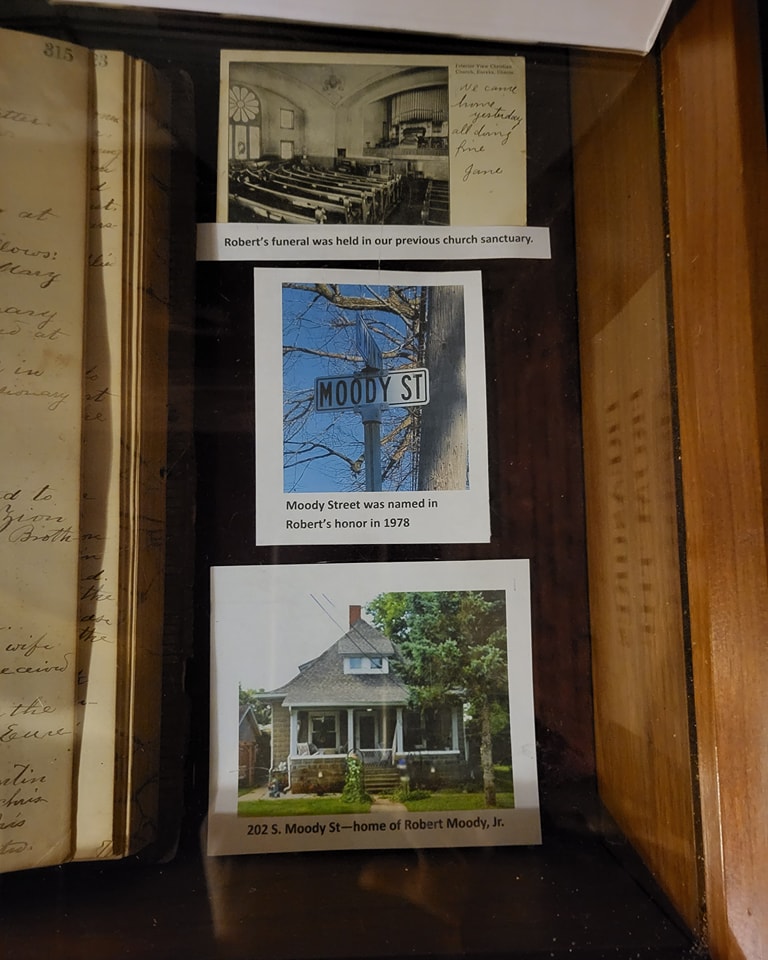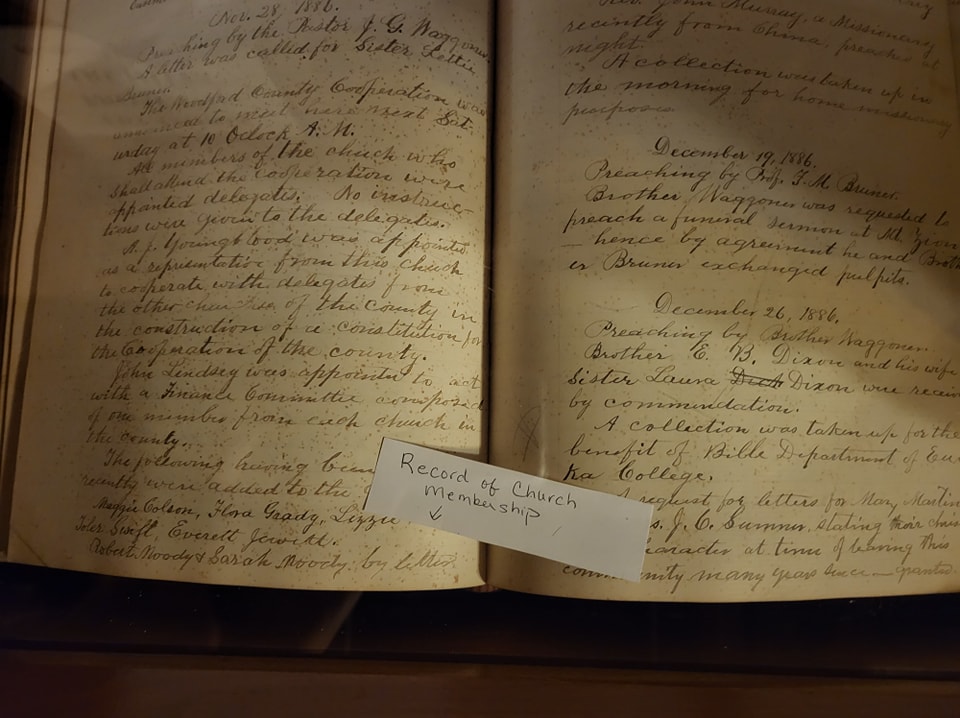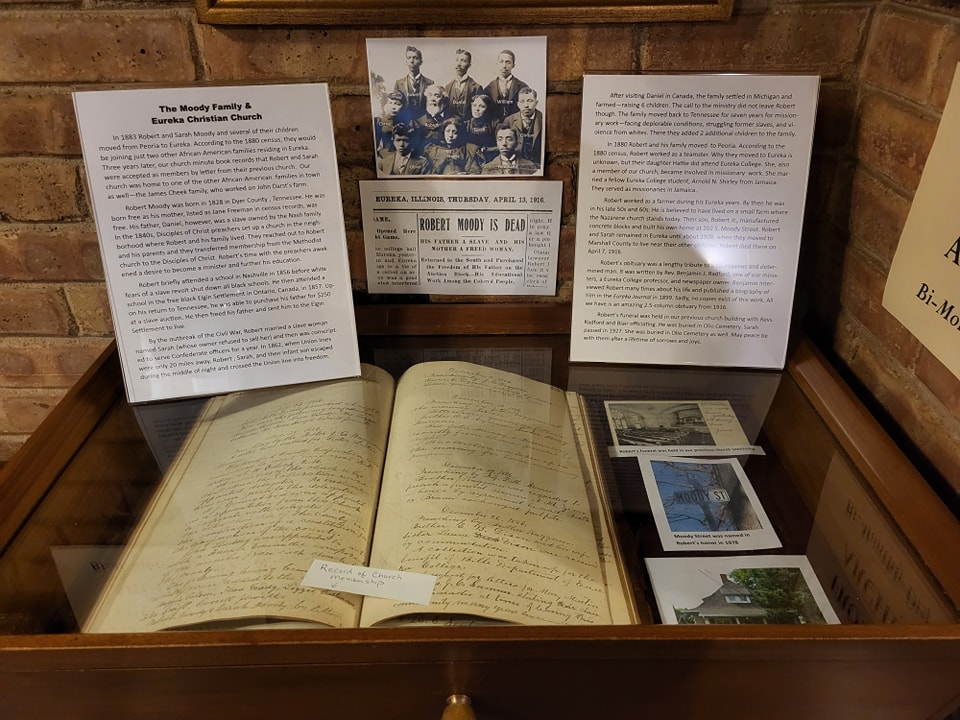In honor of Black History Month, our Historian Cindy O’Neill presents these Treasures from the Archives about the Robert Moody Family, one of the first African-American families to make their home in Eureka, as members of Eureka Christian Church. You can view the pieces shown below in the display case at the back of the ECC Sanctuary, throughout the month of February 2023.
In 1883 Robert and Sarah Moody and several of their children moved from Peoria to Eureka. According to the 1880 census, they would be joining just two other African-American families residing in Eureka. Three years later, our church minute book records that Robert and Sarah were accepted as members by letter from their previous church. Our church was home to one of the other African-American families in town as well-the James Cheek family, who worked on John Darst’s farm.
Robert Moody was born in 1828 in Dyer County, Tennessee. He was born free as his mother, listed as Jane Freeman in census records, was free. His father, Daniel, however, was a slave owned by the Nash family. In the 1840s, Disciples of Christ preachers set up a church in the neighborhood where Robert and his family lived. They reached out to Robert and his parents and they transferred membership from the Methodist church to the Disciples of Christ. Robert’s time with the preachers awakened a desire to become a minister and further his education.
Robert briefly attended a school in Nashville in 1856 before white fears of a slave revolt shut down all black schools. He then attended a school in the free black Elgin Settlement in Ontario, Canada, in 1857. Upon his return to Tennessee, he was able to purchase his father for $250 at a slave auction. He then freed his father and sent him to the Elgin Settlement to live.
By the outbreak of the Civil War, Robert married a slave woman named Sarah (whose owner refused to sell her) and then was conscripted to serve Confederate officers for a year. In 1862, when Union lines were only 20 miles away, Robert, Sarah, and their infant son escaped during the middle of night and crossed the Union line into freedom.
After visiting Daniel in Canada, the family settled in Michigan and farmed-raising 6 children. The call to the ministry did not leave Robert though. The family moved back to Tennessee for seven years for missionary work — facing deplorable conditions, struggling former slaves, and violence from whites. There they added 2 additional children to the family.
In 1880 Robert and his family moved to Peoria. According to the 1880 census, Robert worked as a teamster. Why they moved to Eureka is unknown. Their two youngest children, Hattie and Oliver, graduated from Eureka High School in the 1890s and became teachers. Oliver died in 1899, and Hattie married Arnold N. Shirley from Jamaica in 1903. She met Shirley when he attended Eureka College for a year in 1900-1901. Hattie visited our church several times in later years to share information about their Jamaican missionary work.
Robert worked as a farmer during his Eureka years. By then he was in his late 50s, 60s, and early 70s. He is believed to have lived on a small farm where the Nazarene church stands today. Their son, Robert Jr., manufactured concrete blocks and built his home at 202 S. Moody St. Robert and Sarah remained in Eureka until 1907, when they moved to Marshall County to live near a son. Robert died there on April 7, 1916.
Robert’s obituary was a lengthy tribute to a courageous and determined man. It was written by Rev. Benjamin J. Radford, one of our ministers, a Eureka College professor, and newspaper owner. Benjamin interviewed Robert many times about his life and published a biography of him in the Eureka Journal in 1899. Sadly, no copies exist of this work. All we have is an amazing 2.5-column obituary from 1916.
Robert’s funeral was held in our previous church building with Revs. Radford and Blair officiating. He was buried in Olio Cemetery. Sarah passed in 1927. She was buried in Olio Cemetery as well. May peace be with them after a lifetime of sorrows and joys.





Nice / interesting
What an extraordinary and inspiring life story. Thanks to Cindy for doing this research and sharing the history with us.
Thank you for sending this to me. The Historical Society will be happy to get so much information about the family. Personally, I’m proud of Eureka ‘s early acceptance of people of color and even more proud of the Disciples of Christ.
I love this story of Robert’s life! Definite movie material—very inspirational.